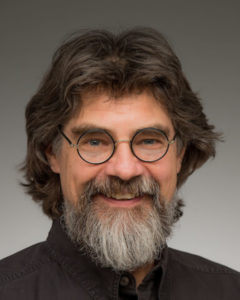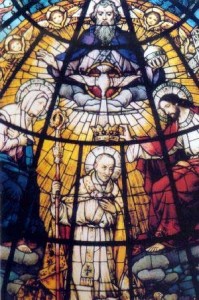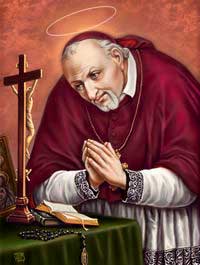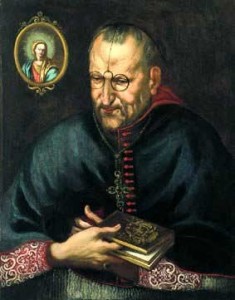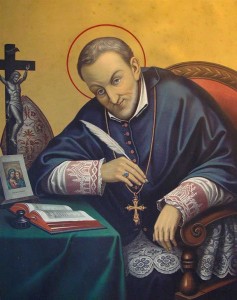Podcast: Play in new window | Download (Duration: 30:45 — 21.2MB) | Embed
Subscribe: Apple Podcasts | Spotify | Amazon Music | Android | Pandora | iHeartRadio | JioSaavn | Podchaser | Gaana | Podcast Index | Email | TuneIn | Deezer | Anghami | RSS | More

St. Bernard of Clairvaux, Pt. 1 – The Doctors of the Church: The Charism of Wisdom with Dr. Matthew Bunson
- Born: 1090, Fontaine-lès-Dijon, France
- Died: August 20, 1153, Clairvaux Abbey, France
- Books: Two-Fold Knowledge
Dr. Matthew Bunsen and Kris McGregor discuss the life and influence of St. Bernard of Clairvaux. St. Bernard, a Doctor of the Church, is celebrated for his deep spirituality, theological brilliance, and reformative impact on monastic life. He was instrumental in building the Cistercian order and defending Church teachings. Bernard’s upbringing in a noble family provided him with a strong education and a profound devotion to Scripture and the Blessed Mother. After resisting worldly temptations, he entered the Benedictine order and helped restore the vigor of the original Rule of St. Benedict at the Abbey of Clairvaux. His leadership and dedication attracted many followers, and Clairvaux flourished under his guidance.
Bernard’s teachings, particularly on the Song of Songs, reflect his eloquent and elegant theology. Despite his desire for a contemplative life, he was frequently called upon by the Church to mediate conflicts, reform ecclesiastical practices, and support the papacy. His work, including his involvement in the Second Crusade, came at a great personal cost, but he remained committed to serving Christ and the Church.
Discerning Hearts Reflection Questions
- The Significance of Spiritual Healing: How does St. Bernard’s title as a healer and miracle worker influence your understanding of spiritual healing in your own life?
- Embracing Austerity: What lessons can you learn from St. Bernard’s severe austerity and self-discipline in pursuing a life dedicated to Christ?
- The Role of Scripture: How can St. Bernard’s love for Scripture, particularly the Song of Songs, deepen your own relationship with the Bible?
- Responding to God’s Call: How does St. Bernard’s choice to join the Benedictine order inspire you to respond to God’s call in your life, even when it requires sacrifice?
- The Power of Prayer and Work: How can you incorporate the balance of prayer and work, as emphasized by the Rule of St. Benedict, into your daily routine?
- Humility in Service: What can you learn from St. Bernard’s humility and willingness to serve the Church, despite his personal preference for a contemplative life?
- Enduring Faithfulness: How does St. Bernard’s lifelong dedication to serving the Church challenge you to remain faithful to your commitments, regardless of personal cost?
![]()
From Vatican.va, an excerpt from the teachings of Pope Benedict XVI General Audience 2009
“Today I would like to talk about St Bernard of Clairvaux, called “the last of the Fathers” of the Church because once again in the 12th century he renewed and brought to the fore the important theology of the Fathers. We do not know in any detail about the years of his childhood; however, we know that he was born in 1090 in Fontaines, France, into a large and fairly well-to-do family. As a very young man he devoted himself to the study of the so-called liberal arts especially grammar, rhetoric and dialectics at the school of the canons of the Church of Saint-Vorles at Châtillon-sur-Seine; and the decision to enter religious life slowly matured within him. At the age of about 20, he entered Cîteaux, a new monastic foundation that was more flexible in comparison with the ancient and venerable monasteries of the period while at the same time stricter in the practice of the evangelical counsels. A few years later, in 1115, Bernard was sent by Stephen Harding, the third Abbot of Cîteaux, to found the monastery of Clairvaux. Here the young Abbot he was only 25 years old was able to define his conception of monastic life and set about putting it into practice. In looking at the discipline of other monasteries, Bernard firmly recalled the need for a sober and measured life, at table as in clothing and monastic buildings, and recommended the support and care of the poor. In the meantime the community of Clairvaux became ever more numerous and its foundations multiplied.
In those same years before 1130 Bernard started a prolific correspondence with many people of both important and modest social status. To the many Epistolae of this period must be added numerous Sermones, as well as Sententiae and Tractatus. Bernard’s great friendship with William, Abbot of Saint-Thierry, and with William of Champeaux, among the most important figures of the 12th century, also date to this period. As from 1130, Bernard began to concern himself with many serious matters of the Holy See and of the Church. For this reason he was obliged to leave his monastery ever more frequently and he sometimes also travelled outside France. He founded several women’s monasteries and was the protagonist of a lively correspondence with Peter the Venerable, Abbot of Cluny, of whom I spoke last Wednesday. In his polemical writings he targeted in particular Abelard, a great thinker who had conceived of a new approach to theology, introducing above all the dialectic and philosophical method in the constructi0n of theological thought. On another front Bernard combated the heresy of the Cathars, who despised matter and the human body and consequently despised the Creator. On the other hand, he felt it was his duty to defend the Jews, and condemned the ever more widespread outbursts of anti-Semitism. With regard to this aspect of his apostolic action, several decades later Rabbi Ephraim of Bonn addressed a vibrant tribute to Bernard. In the same period the holy Abbot wrote his most famous works such as the celebrated Sermons on the Song of Songs [In Canticum Sermones]. In the last years of his life he died in 1153 Bernard was obliged to curtail his journeys but did not entirely stop travelling. He made the most of this time to review definitively the whole collection of his Letters, Sermons and Treatises. Worthy of mention is a quite unusual book that he completed in this same period, in 1145, when Bernardo Pignatelli, a pupil of his, was elected Pope with the name of Eugene III. On this occasion, Bernard as his spiritual father, dedicated to his spiritual son the text De Consideratione [Five Books on Consideration] which contains teachings on how to be a good Pope. In this book, which is still appropriate reading for the Popes of all times, Bernard did not only suggest how to be a good Pope, but also expressed a profound vision of the Mystery of the Church and of the Mystery of Christ which is ultimately resolved in contemplation of the mystery of the Triune God. “The search for this God who is not yet sufficiently sought must be continued”, the holy Abbot wrote, “yet it may be easier to search for him and find him in prayer rather than in discussion. So let us end the book here, but not the search” (XIV, 32: PL 182, 808) and in journeying on towards God.”
For more visit Vatican.va
For more from Dr. Matthew Bunson, check out his Discerning Hearts page.
Dr. Matthew E. Bunson is a Register senior editor and a senior contributor to EWTN News. For the past 20 years, he has been active in the area of Catholic social communications and education, including writing, editing, and teaching on a variety of topics related to Church history, the papacy, the saints and Catholic culture. He is faculty chair at Catholic Distance University, a senior fellow of the St. Paul Center for Biblical Theology, and the author or co-author of over 50 books including The Encyclopedia of Catholic History, The Pope Encyclopedia, We Have a Pope! Benedict XVI, The Saints Encyclopedia and best-selling biographies of St. Damien of Molokai and St. Kateri Tekakwitha.

